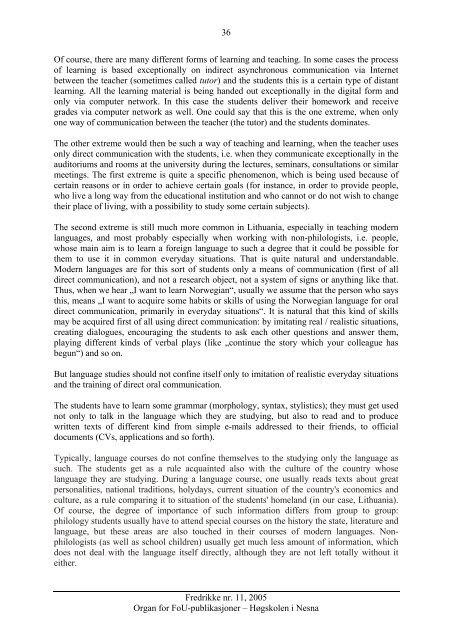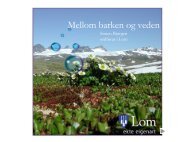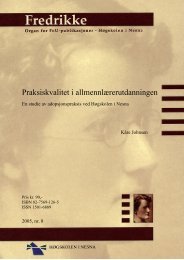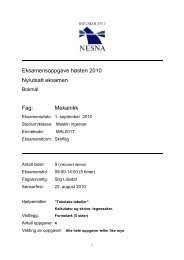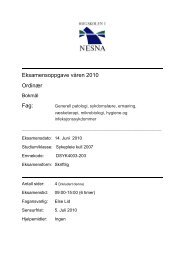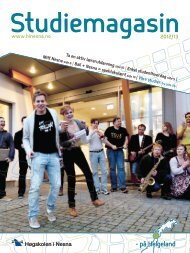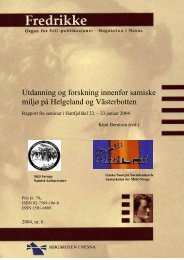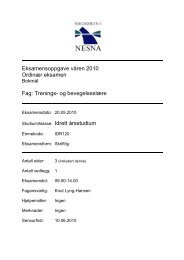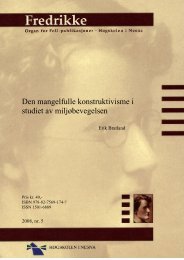ikt-basert norskundervisning i utlandet - Høgskolen i Nesna
ikt-basert norskundervisning i utlandet - Høgskolen i Nesna
ikt-basert norskundervisning i utlandet - Høgskolen i Nesna
Create successful ePaper yourself
Turn your PDF publications into a flip-book with our unique Google optimized e-Paper software.
36<br />
Of course, there are many different forms of learning and teaching. In some cases the process<br />
of learning is based exceptionally on indirect asynchronous communication via Internet<br />
between the teacher (sometimes called tutor) and the students this is a certain type of distant<br />
learning. All the learning material is being handed out exceptionally in the digital form and<br />
only via computer network. In this case the students deliver their homework and receive<br />
grades via computer network as well. One could say that this is the one extreme, when only<br />
one way of communication between the teacher (the tutor) and the students dominates.<br />
The other extreme would then be such a way of teaching and learning, when the teacher uses<br />
only direct communication with the students, i.e. when they communicate exceptionally in the<br />
auditoriums and rooms at the university during the lectures, seminars, consultations or similar<br />
meetings. The first extreme is quite a specific phenomenon, which is being used because of<br />
certain reasons or in order to achieve certain goals (for instance, in order to provide people,<br />
who live a long way from the educational institution and who cannot or do not wish to change<br />
their place of living, with a possibility to study some certain subjects).<br />
The second extreme is still much more common in Lithuania, especially in teaching modern<br />
languages, and most probably especially when working with non-philologists, i.e. people,<br />
whose main aim is to learn a foreign language to such a degree that it could be possible for<br />
them to use it in common everyday situations. That is quite natural and understandable.<br />
Modern languages are for this sort of students only a means of communication (first of all<br />
direct communication), and not a research object, not a system of signs or anything like that.<br />
Thus, when we hear „I want to learn Norwegian“, usually we assume that the person who says<br />
this, means „I want to acquire some habits or skills of using the Norwegian language for oral<br />
direct communication, primarily in everyday situations“. It is natural that this kind of skills<br />
may be acquired first of all using direct communication: by imitating real / realistic situations,<br />
creating dialogues, encouraging the students to ask each other questions and answer them,<br />
playing different kinds of verbal plays (like „continue the story which your colleague has<br />
begun“) and so on.<br />
But language studies should not confine itself only to imitation of realistic everyday situations<br />
and the training of direct oral communication.<br />
The students have to learn some grammar (morphology, syntax, stylistics); they must get used<br />
not only to talk in the language which they are studying, but also to read and to produce<br />
written texts of different kind from simple e-mails addressed to their friends, to official<br />
documents (CVs, applications and so forth).<br />
Typically, language courses do not confine themselves to the studying only the language as<br />
such. The students get as a rule acquainted also with the culture of the country whose<br />
language they are studying. During a language course, one usually reads texts about great<br />
personalities, national traditions, holydays, current situation of the country's economics and<br />
culture, as a rule comparing it to situation of the students' homeland (in our case, Lithuania).<br />
Of course, the degree of importance of such information differs from group to group:<br />
philology students usually have to attend special courses on the history the state, literature and<br />
language, but these areas are also touched in their courses of modern languages. Nonphilologists<br />
(as well as school children) usually get much less amount of information, which<br />
does not deal with the language itself directly, although they are not left totally without it<br />
either.<br />
Fredrikke nr. 11, 2005<br />
Organ for FoU-publikasjoner – <strong>Høgskolen</strong> i <strong>Nesna</strong>


